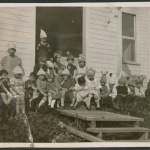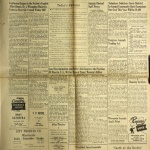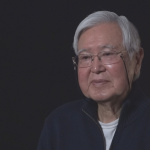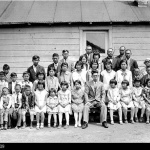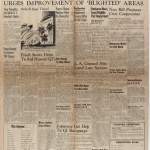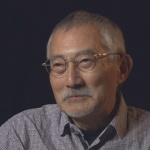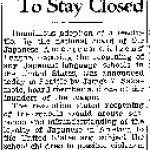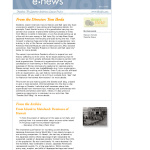Takie Okumura
Japanese Christian minister who founded the Makiki Christian Church and established the Okumura Boys and Girls Home, the first Japanese-language school , and the AJA ( Americans of Japanese ancestry ) baseball league in Hawai'i. [1]
Born in Okawa Machi, Kōchi shi, Kōchi ken (prefecture) in Japan to Matajuro Okumura, governor of a district in Tosa, Okumura (1864–1951) was baptized on September 9, 1888 and admitted to the Osaka Christian church. In September 1890, he entered Dōshisha University Theological Seminary in Kyoto to dedicate his life to Christian work. After graduation, he was influenced by Dr. Jerome Davis, father of Merle Davis, who was formerly with the local Institute of Pacific Relations and by Dr. John Gulick to accept an invitation to Hawai'i. Okumura arrived in the Islands in August 1894 at the age of twenty-nine. Despite the challenges of preaching Christianity "in the midst of such a topsy-turvy community" where men "ridiculed and threw stones at me," Okumura continued his work of spreading the message of God to the Japanese immigrants. [2] He was the pastor of the Japanese Christian Church, the predecessor of Nu'uanu Congregational Church, from September 1894 to October 1902 when he resigned. He organized the Makiki Church on April 8, 1904 with twenty-four members. When he retired in 1937, the membership had reached 799 members.
As a prominent educator and activist in Hawai'i, Okumura established a Japanese kindergarten and the Honolulu Japanese Elementary School (later Hawai'i Chuō Gakuin and then Central Institute) in April 1896; the Japanese YMCA on April 28, 1900, which became a department of the Honolulu YMCA in 1912; the Temperance Society in May 1892; and the Benevolent Society in May 1889. [3] In August of 1896, he founded the Okumura Boys and Girls Home, formerly known as the Japanese boarding school to provide affordable housing for young adult immigrants. Although he retired as a pastor from church work in 1937, he still served as head of the home until his death in 1951. Unlike many other Issei leaders in Hawai'i, Okumura was not interned during World War II and continued his work under martial law . During his life, Okumura was also active in the Territorial educational campaign, New American Conferences, and the Japanese Language Education association, conducting language classes in the local public schools. Additionally, Okumura extensively wrote under the pen name "Roku Seki" publishing various periodical such as The Tomo, The Hikari, The Kyoho, The Rakuen Jiho (The Paradise Times), and until his death The Rakuen no Ochiba.
Although the Japanese government tried to award Okumura medals for meritorious service on three different occasions, Okumura declined declaring that his efforts were for his people and for the building of his program in Hawai'i. His death in 1951 was attended by numerous prominent individuals in the Islands in revealing the influence of Okumura in the establishment of the Japanese community in Hawai'i. [4]
For More Information
Cataluna, Lee. "Minister's Care Lasts a Century." Honolulu Advertiser, February 20, 2004, http://the.honoluluadvertiser.com/article/2004/Feb/20/ln/ln53alee.html
Kitano, Harry H. L. Japanese Americans: The Evolution of a Subculture . 1969. 2nd Edition. Englewood Cliffs, NJ: Prentice-Hall, Inc., 1976.
Kotani, Roland. The Japanese in Hawaii: A Century of Struggle. Honolulu: Hochi, Ltd., 1985.
Monobe, Hiromi. "Takie Okumura and the 'Americanization' of the Nisei in Hawaii." Ph.D. dissertation, University of Hawai'i at Manoa, 2004.
Okumura, Takie. Seventy Years of Divine Blessings . Honolulu: T. Okumura, Shōwa 15 [1940].
Okumura, Takie. "Story of Okumura Home," Honolulu Advertiser , March 25 (p. 8), 26 (6), 27 (6), and 29 (6), 1951.
"Rev. Okumura, Noted Island Educator, Dies." University of Hawai'i at Mānoa Hamilton Library, Microfiche "Okumura, Rev. Takie," University of Hawai'i at Mānoa. Microfiche D98050 Biographical.
"Takie Okumura, 86, Kamaaina Minister, Dies," University of Hawai'i at Mānoa Hamilton Library, Microfiche "Okumura, Rev. Takie," University of Hawai'i at Mānoa. Microfiche D98050 Biographical.
Footnotes
- ↑ Research for this article was supported by a grant from the Hawai‘i Council for the Humanities .
- ↑ Takie Okumura, Seventy Years of Divine Blessings (Honolulu: T. Okumura ; Shōwa 15 [1940]), 3.
- ↑ "Rev. Okumura, Noted Island Educator, Dies," University of Hawai'i at Mānoa Hamilton Library, Microfiche "Okumura, Rev. Takie," University of Hawai'i at Mānoa. Microfiche D98050 Biographical
- ↑ Honorary pall bearers at Okumura's funeral included: Yasutaro Soga , Dr. Ichiro Katsuki, Kumatsuchi Nakamura, Nu'uanu church; Masukichi Imai, Makiki church; Wade Warren Thayer, New Americans Conference; Dr. J. Leslie Dunstan, Hawaiian Board of Missions; the Rev. Phillip T. Fukao, Japanese Ministers' association; Katsutaro Yasumori, Japanese YMCA; Dr. Iga Mori, Japanese Benevolent association; Dr. Kikujiro C. Kondo, Japanese Language Education Association, and Chung K. Ai. Active pall bearers were: Dr. Bunji Tokioka, alumnus of the Okumura home; Yoshiharu Kondo; Taro Tabata, deacon of Makiki church; Goro Endo, member of Okumura Home; Clifton H. Yamamoto, New Americans Conference; the Rev. Harry S. Komuro, Ministers group; Tsunekichi Nagasaki from Tosa, Japan; and the Rev. Masayoshi Wakai, minister from the Okumura Home. "Takie Okumura, 86, Kamaaina Minister, Dies," University of Hawai'i at Mānoa Hamilton Library, Microfiche "Okumura, Rev. Takie," University of Hawai'i at Mānoa. Microfiche D98050 Biographical.
Last updated July 14, 2020, 7:07 p.m..

